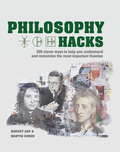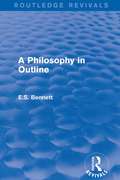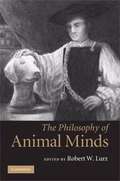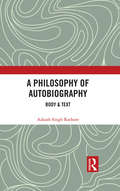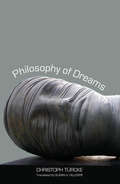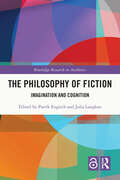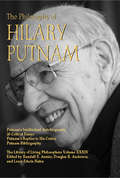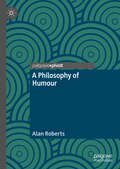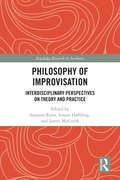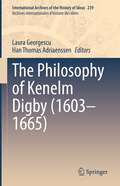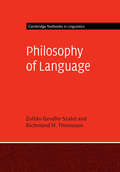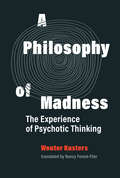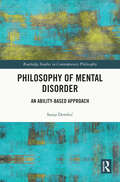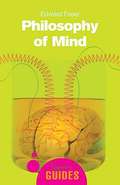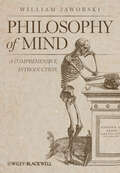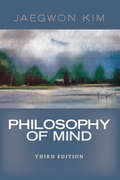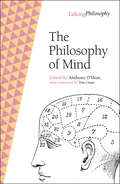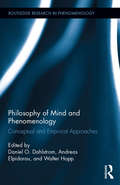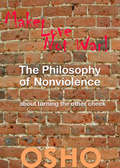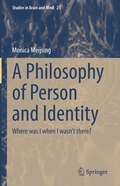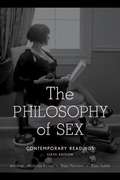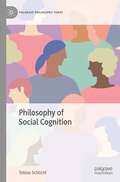- Table View
- List View
Philosophy Hacks (Hacks Ser.)
by Robert Arp Martin CohenDiscover the simple way to understand and remember the most groundbreaking concepts in 3,000 years of philosophical thought. Each idea is broken down into three stages: 1/ The helicopter view, which gives you an introduction to the idea, and some context around it. 2/ The shortcut, which gives you the core elements of the theory, along with a range of examples that everyone can understand. 3/ The hack, which is a one-liner designed to stick in your memory and give you an instant grasp of the concept.From Pascal's Wager to Kant's categorical imperative, and from Camus's Existential Nihilism to Arendt's Banality of Evil, there are 100 concepts explained. The perfect introduction to philosophy, this is a great new way to learn about the most important philosophical ideas and concepts in a way that makes them easy to recall even months after reading the book.
A Philosophy in Outline (Routledge Revivals)
by E.S. BennettFirst published in 1931, this book provides a brief overview of the essentials of philosophy. It aims to combat the notion of the inaccessibility of philosophy by providing an introduction to its history and what the author believes to a ‘minimum dose…of incontrovertible philosophical truth’. The book merely assumes an ordinary level of adult education and offers an outline of the key areas of philosophy — consciousness, reality, experience, Life, God, love, aesthetics, conduct, logic — and as such will be of interest as a very useful starting point for anyone wishing to undertake further studies.
The Philosophy of Animal Minds
by Robert W. LurzThis volume is a collection of fourteen new essays by leading philosophers on issues concerning the nature, existence, and our knowledge of animal minds. The nature of animal minds has been a topic of interest to philosophers since the origins of philosophy, and recent years have seen significant philosophical engagement with the subject. However, there is no volume that represents the current state of play in this important and growing field. The purpose of this volume is to highlight the state of the debate. The issues which are covered include whether and to what degree animals think in a language or in iconic structures, possess concepts, are conscious, self-aware, metacognize, attribute states of mind to others, and have emotions, as well as issues pertaining to our knowledge of and the scientific standards for attributing mental states to animals.
A Philosophy of Autobiography: Body & Text
by Aakash Singh RathoreThis book offers intimate readings of a diverse range of global autobiographical literature with an emphasis on the (re)presentation of the physical body. The twelve texts discussed here include philosophical autobiography (Nietzsche), autobiographies of self-experimentation (Gandhi, Mishima, Warhol), literary autobiography (Hemingway, Das) as well as other genres of autobiography, including the graphic novel (Spiegelman, Satrapi), as also documentations of tragedy and injustice and subsequent spiritual overcoming (Ambedkar, Pawar, Angelou, Wiesel). In exploring different literary forms and orientations of the autobiographies, the work remains constantly attuned to the physical body, a focus generally absent from literary criticism and philosophy or study of leading historical personages, with the exception of patches within phenomenological philosophy and feminism. The book delves into how the authors treated here deal with the flesh through their autobiographical writing and in what way they embody the essential relationship between flesh, spirit and word. It analyses some seminal texts such as Ecce Homo, The Story of My Experiments with Truth, Waiting for a Visa, I Know Why the Caged Bird Sings, A Moveable Feast, Night, Baluta, My Story, Sun and Steel, The Philosophy of Andy Warhol, MAUS and Persepolis. Lucid, bold and authoritative, this book will be of great interest to scholars and researchers of philosophy, literature, gender studies, political philosophy, media and popular culture, social exclusion, and race and discrimination studies.
Philosophy of Dreams
by Christoph Turcke Susan H. GillespieWhy has humankind developed so differently from other animals? How and why did language, culture, religion, and the arts come into being? In this wide-ranging and ambitious essay, Christoph Türcke offers a new answer to these timeworn questions by scrutinizing the phenomenon of the dream, using it as a psychic fossil connecting us with our Stone Age ancestors. Provocatively, he argues that both civilization and mental processes are the results of a compulsion to repeat early traumas, one to which hallucination, imagination, mind, spirit, and God all developed in response. Until the beginning of the modern era, repetition was synonymous with de-escalation and calming down. Then, automatic machinery gave rise to a new type of repetition, whose effects are permanent alarm and distraction. The new global forces of distraction, Türcke argues, are producing a specific kind of stress that breaks down the barriers between dreams and waking consciousness. Türcke’s essay ends with a sobering indictment of this psychic deregulation and the social and economic deregulations that have accompanied it.
The Philosophy of Fiction: Imagination and Cognition (Routledge Research in Aesthetics)
by Patrik Engisch Julia LangkauThis book presents new research on the crucial role that imagination plays in contemporary philosophy of fiction. The first part of the book challenges the main paradigm set by Kendall Walton and Gregory Currie, according to which there is a necessary connection between fiction and a prescription that we engage imaginatively with its content. The contributors address the fundamental questions of how we can define fiction, and especially whether we can define fiction in terms of imagination. The second part focuses on a distinct but related question: can we point to some distinctive experiential features of our engagement with fiction? In the third part, the focus lies on the cognitive value of fiction and on the role that imagination plays in that respect. The chapters in this part discuss the cognitive value of fiction with respect to issues such as the training of the faculty of imagination, phenomenal experience, empathy, and the emotions. The Philosophy of Fiction will be of interest to scholars and advanced students working in aesthetics, philosophy of mind, epistemology, and literary studies. Chapter 13 of this book is available for free in PDF format as Open Access from the individual product page at www.routledge.com. It has been made available under a Creative Commons Attribution-Non Commercial-No Derivatives 4.0 license.
The Philosophy of Hilary Putnam
by Randall E. Auxier Douglas R. Anderson Lewis Edwin HahnHilary Putnam, who turned 88 in 2014, is one of the world's greatest living philosophers. He currently holds the position of Cogan University Professor Emeritus of Harvard. He has been called "one of the 20th century's true philosophic giants" (by Malcolm Thorndike Nicholson in Prospect magazine in 2013). He has been very influential in several different areas of philosophy: philosophy of mathematics, philosophy of language, philosophy of mind, and philosophy of science. This volume in the prestigious Library of Living Philosophers series contains 26 chapters original to this work, each written by a well-known philosopher, including the late Richard Rorty and the late Michael Dummett. The volume also includes Putnam's reply to each of the 26 critical and descriptive essays, which cover the broad range of Putnam's thought. They are organized thematically into the following parts: Philosophy and Mathematics, Logic and Language, Knowing and Being, Philosophy of Practice, and Elements of Pragmatism. Readers will also appreciate the extensive Intellectual Autobiography.
A Philosophy of Humour
by Alan RobertsHumour is a funny thing - everyone knows it but no-one knows what it is. This book addresses the question 'What is humour?' by first untangling the definitions of humour, amusement and funniness before then providing a new theory of humour which draws upon recent research in philosophy, psychology, linguistics and neuroscience. The theory is built up without assuming any prior knowledge and illustrated through humorous examples which are both entertaining and educational for anyone curious about what makes things funny. The book is then an accessible illumination of joking matters from dinner tables to online platforms to comedy clubs.
Philosophy of Improvisation: Interdisciplinary Perspectives on Theory and Practice (Routledge Research in Aesthetics)
by Susanne Ravn; Simon Høffding; James McGuirkThis volume brings together philosophical and interdisciplinary perspectives on improvisation. The contributions connect the theoretical dimensions of improvisation with different viewpoints on its practice in the arts and the classroom. The chapters address the phenomenon of improvisation in two related ways. On the one hand, they attend to the lived practices of improvisation both within and without the arts in order to explain the phenomenon. They also extend the scope of improvisational practices to include the role of improvisation in habit and in planned action, at both individual and collective levels. Drawing on recent work done in the philosophy of mind, they address questions such as whether improvisation is a single unified phenomenon or whether it entails different senses that can be discerned theoretically and practically. Finally, they ask after the special kind of improvisational expertise which characterizes musicians, dancers, and other practitioners, an expertise marked by the artist’s ability to participate competently in complex situations while deliberately relinquishing control. Philosophy of Improvisation will appeal to anyone with a strong interest in improvisation, to researchers working in philosophy, aesthetics, and pedagogy as well as practitioners involved in different kinds of music, dance, and theater performances.
The Philosophy of Kenelm Digby (International Archives of the History of Ideas Archives internationales d'histoire des idées #239)
by Laura Georgescu Han Thomas AdriaenssenThis book examines the philosophical and scientific achievements of Sir Kenelm Digby, a successful English diplomat, privateer and natural philosopher of the mid-1600s. Not widely remembered today, Digby is one of the most intriguing figures in the history of early modern philosophers. Among scholars, he is known for his attempt to reconcile what perhaps seem to be irreconcilable philosophical frameworks: Aristotelianism and early modern mechanism.This contributed volume offers the first full-length treatment of Digby’s work and of the unique position he occupied in early modern intellectual history. It explores key aspects of Digby’s metaphysics, epistemology, and philosophical method, and offers a new appraisal of his contributions to early modern natural philosophy and mathematics.A dozen contributors offer their expert insight into such topics asBody, quantity, and measures in Digby's natural philosophyEcumenism and common notions in DigbyAristotelianism and accidents in Digby's philosophyDigby on body and soulDigby on method and experimentsThis book volume will be of benefit to a broad audience of scholars, educators, and students of the history of early modern science and philosophy.
Philosophy of Language (Cambridge Textbooks in Linguistics)
by Zoltán Gendler Szabó Richmond H. ThomasonThis unique textbook introduces linguists to key issues in the philosophy of language. Accessible to students who have taken only a single course in linguistics, yet sophisticated enough to be used at the graduate level, the book provides an overview of the central issues in philosophy of language, a key topic in educating the next generation of researchers in semantics and pragmatics. Thoroughly grounded in contemporary linguistic theory, the book focus on the core foundational and philosophical issues in semantics and pragmatics, richly illustrated with historical case studies to show how linguistic questions are related to philosophical problems in areas such as metaphysics, epistemology, and ethics. Students are introduced in Part I to the issues at the core of semantics, including compositionality, reference and intentionality. Part II looks at pragmatics: context, conversational update, implicature and speech acts; whilst Part III discusses foundational questions about meaning. The book will encourage future collaboration and development between philosophy of language and linguistics.
A Philosophy of Madness: The Experience of Psychotic Thinking
by Wouter KustersAn incredible publishing event: a philosopher draws on his own experience of madness as he takes readers on an unforgettble journey through the philosophy of psychosis and the psychosis of philosophy.In this book, philosopher and linguist Wouter Kusters examines the philosophy of psychosis--and the psychosis of philosophy. By analyzing the experience of psychosis in philosophical terms, Kusters not only emancipates the experience of the psychotic from medical classification, he also emancipates the philosopher from the narrowness of academia, allowing philosphers to engage in real-life praxis, philosophy in vivo. Philosophy and madness--Kusters's preferred, non-medicalized term--coexist, one mirroring the other. Drawing on his own experience of madness--two episodes of psychosis, twenty years apart--Kusters argues that psychosis presents itself to the psychotic as an inescapable truth and reality.
Philosophy of Mental Disorder: An Ability-Based Approach (Routledge Studies in Contemporary Philosophy)
by Sanja DembićThis book offers an ability-based view of mental disorders. It develops a detailed analysis of the concept of inability that is relevant in the psychiatric and psychotherapeutic context by drawing on the most recent literature on the concepts of ability, reasons, and harm. What is it to have a mental disorder? This book contends that an individual has a mental disorder if and only if (1) they are・in the relevant sense・unable to respond adequately to their available (apparent) reasons in their thinking, feeling, or acting, and (2) they are harmed by the condition underlying or resulting from that inability. The author calls this the “Rehability View.” This view can account for what is “mental” about mental disorders: it is the rational relations among an individual’s attitudes and actions that are “disordered,” and the relevant norms are the norms of reasons. This view is compatible with explanations of mental disorders in terms of biological dysfunctions, without reducing the former to the latter. The aim is not to offer just another conception of mental disorder, but to develop a systematic approach that incorporates insights from the philosophy of psychiatry and adjacent philosophical disciplines. Philosophy of Mental Disorder will be of interest to scholars and advanced students working in philosophy of psychiatry, philosophy of mind, philosophy of action, ethics, and mental health.
Philosophy of Mind: Classical and Contemporary Readings
by David J. ChalmersA collection of articles ranging from Descartes to the present, covering the major issues and controversies in the philosophy of mind.
Philosophy of Mind: A Beginner's Guide (Beginner's Guides)
by Edward FeserIn this lively and entertaining introduction to the philospohy of the mind, Edward Feser explores the questions central to the discipline.
Philosophy of Mind: A Comprehensive Introduction
by William JaworskiPhilosophy of Mind introduces readers to one of the liveliest fields in contemporary philosophy by discussing mind-body problems and the various solutions to them. It provides a detailed yet balanced overview of the entire field that enables readers to jump immediately into current debates. Treats a wide range of mind-body theories and arguments in a fair and balanced way Shows how developments in neuroscience, biology, psychology, and cognitive science have impacted mind-body debates Premise-by-premise arguments for and against each position enable readers to grasp the structure of each argument quickly and easily Diagrams and illustrations help readers absorb the more complex ideas Bibliographic essays at the end of each chapter bring readers up to date on the latest literature Written in a clear, easy to read style that is free of technical jargon, and highly accessible to a broad readership The only book to explain systematically how a hylomorphic theory such as Aristotle’s can contribute to current mind-body debates and vie with current mind-body theories Online chapters on free will and the philosophy of persons make the book a flexible teaching tool for general and introductory philosophy courses - available at www.wiley.com/go/jaworski
Philosophy of Mind
by Jaegwon KimThe philosophy of mind has long been part of the core philosophy curriculum, and this book is the classic, comprehensive survey of the subject. Designed as an introduction to the field for upper-level undergraduates and graduate students, Philosophy of Mind focuses on the mind-body problem and related issues, some touching on the status of psychology and cognitive science. The third edition has been thoroughly updated throughout to reflect developments of the past decade, and it is the only text of its kind that provides a serious and respectful treatment of substance dualism. This edition also includes two new chapters on the nature of consciousness and the status of consciousness. Throughout the text, author Jaegwon Kim allows readers to come to their own terms with the central problems of the mind. At the same time, Kim’s emerging views are on display and serve to move the discussion forward. Comprehensive, clear, and fair, Philosophy of Mind is a model of philosophical exposition and a significant contribution to the field.
Philosophy of Mind
by Jaegwon KimKim (philosophy, Brown U. ) presents an updated third edition of the classic book which presents a concise overview of the philosophy of mind. First introduced by Descartes 400 years ago, philosophy of mind is a broad philosophical approach to consciousness and the mind-body relationship. This introductory work for upper-level philosophy students has been updated with new sections on consciousness as well as an overall improvement of the book's language flow. Annotation ©2011 Book News, Inc. , Portland, OR (booknews. com)
Philosophy of Mind
by Jaegwon KimThe philosophy of mind has long been part of the core philosophy curriculum, and this book is the classic, comprehensive survey of the subject. Designed as an introduction to the field for upper-level undergraduates and graduate students, Philosophy of Mind focuses on the mind-body problem and related issues, some touching on the status of psychology and cognitive science. The third edition has been thoroughly updated throughout to reflect developments of the past decade, and it is the only text of its kind that provides a serious and respectful treatment of substance dualism. This edition also includes two new chapters on the nature of consciousness and the status of consciousness. Improved readability and clarity has been one important aim of the new edition. Throughout the text, author Jaegwon Kim allows readers to come to their own terms with the central problems of the mind. At the same time, Kim's own emerging views are on display and serve to move the discussion forward. Comprehensive, clear, and fair, Philosophy of Mind is a model of philosophical exposition and a significant contribution to the field.
The Philosophy of Mind (Talking Philosophy)
by Anthony O’Hear Tim CraneA deep concern with consciousness and intentionality is one of the several things that has lately moved into the centre of the philosophy of mind. The issue of consciousness is often treated as something distinct from intentionality, but – as Tim Crane notes in his incisive new Foreword – there is now something of a sea-change. This classic volume may be at least partly responsible for the shift in how philosophy of mind is starting to be understood. Before its first appearance, discussions of consciousness and intentionality in the context of perception were in their infancy. The book was a departure from the way this part of philosophy was conceived. It pointed to new ways to look at the discipline, addressing both the epistemology of mind, and intentionality and consciousness, especially in connection with perception. Showcasing many leading figures in the field, it offers a splendid overview of the issues at stake.
Philosophy of Mind and Phenomenology: Conceptual and Empirical Approaches (Routledge Research in Phenomenology)
by Daniel O. Dahlstrom Walter Hopp Andreas ElpidorouThis volume identifies and develops how philosophy of mind and phenomenology interact in both conceptual and empirically-informed ways. The objective is to demonstrate that phenomenology, as the first-personal study of the contents and structures of our mentality, can provide us with insights into the understanding of the mind and can complement strictly analytical or empirically informed approaches to the study of the mind. Insofar as phenomenology, as the study or science of phenomena, allows the mind to appear, this collection shows how the mind can reappear through a constructive dialogue between different ways—phenomenological, analytical, and empirical—of understanding mentality.
The Philosophy of Nonviolence
by Osho Osho International FoundationWhile nonviolence is a philosophy to Mahatma Gandhi; it is not a philosophy to Osho, but an experience. Osho talks about his understanding of reverence for life, he does not use the word non-violence.
A Philosophy of Person and Identity: Where was I when I wasn’t there? (Studies in Brain and Mind #21)
by Monica MeijsingThis book discusses the themes of personhood and personal identity. It argues that while there is a metaphysical answer to the question of personal identity, there is no metaphysical answer to the question of what constitutes a person. The author argues against both body-mind dualism and physicalism and also against the idea that there is some metaphysically real category of persons distinct from the category of human beings or human organisms. Instead, the author presents neutral-monist, autopoietic-enactivist kind of metaphysics of the human being, and a relational, and completely human-dependent notion of a person. The tools used in these arguments include conceptual argumentation and empirical case studies. Using both personal experiences and studies of cultures all over the world, the author examines dualism between mind and body. The author discusses real people who seem to live a Cartesian life, as somehow disembodied minds as well as the concept of the person. The author uses the concluding chapters to present their own views arguing that questions about our identity should be separated from questions of our personhood as well as the concept of personhood. This volume is of interest to scholars of philosophy of mind.
Philosophy of Sex
by Raja Halwani Nicholas Power Alan SobleFeaturing twenty-nine essays, thirteen of which are new to this edition, this best-selling volume examines the nature, morality, and social meanings of contemporary sexual phenomena. Topics include sexual desire, masturbation, sex on the Internet, homosexuality, transgender and transsexual issues, marriage, consent, exploitation, objectification, rape, pornography, promiscuity, and prostitution.
Philosophy of Social Cognition (Palgrave Philosophy Today)
by Tobias SchlichtThis introductory textbook provides a comprehensive and up-to-date overview of the main issues in contemporary philosophy of social cognition. It explains and critically discusses each of the key philosophical answers to the captivating question of how we understand the mental life of other sentient creatures. Key Features:· Clearly and fully describes the major theoretical approaches to the understanding of other people’s minds.· Suggests the major advantages and limitations of each approach, indicating how they differ as well as the ideas they have in common. · Tests each philosophical theory against the best available empirical data from psychology, neuroscience and psychopathology.· Includes suggestions for additional reading and practice study questions at the end of each chapter. Philosophy of Social Cognition is essential reading for all undergraduate and graduate students taking introductory courses on social cognition. It is also ideal for courses on cognitive neuroscience, social psychology and sociological theory.
